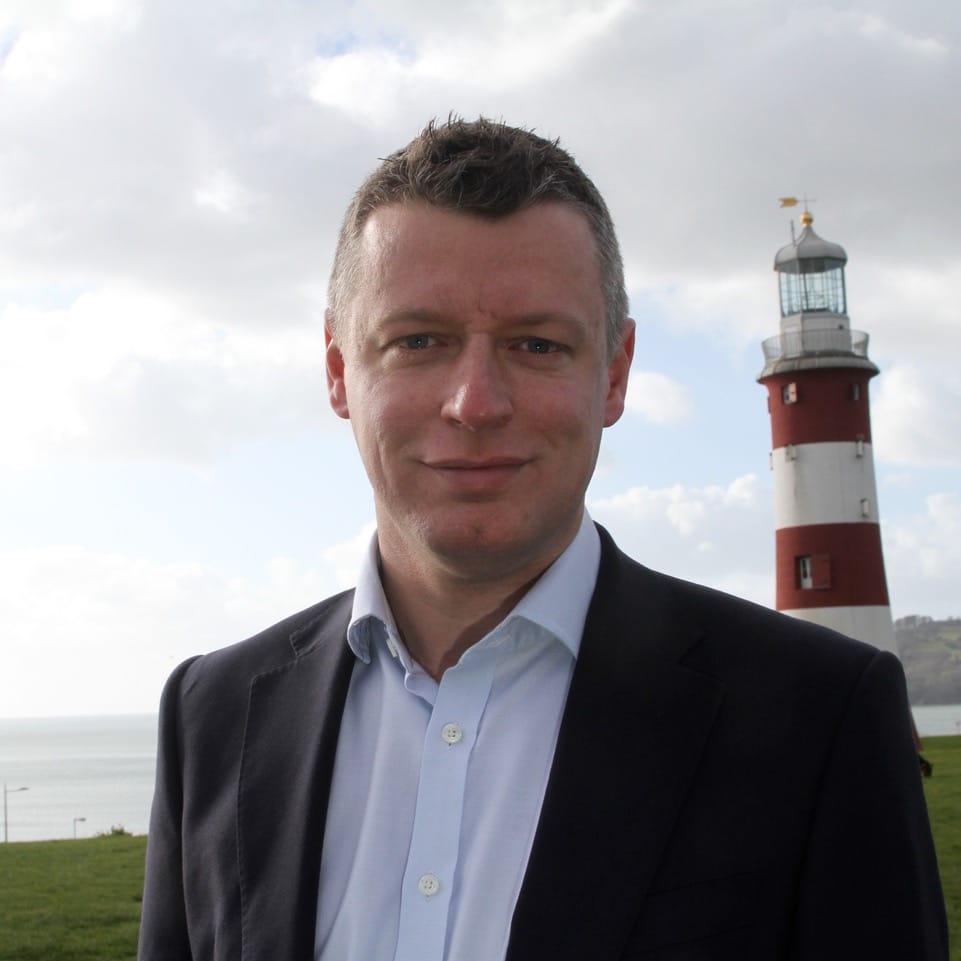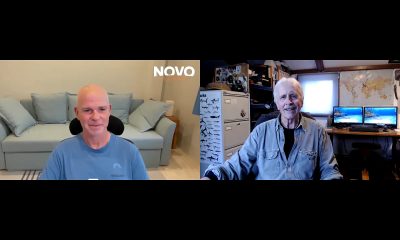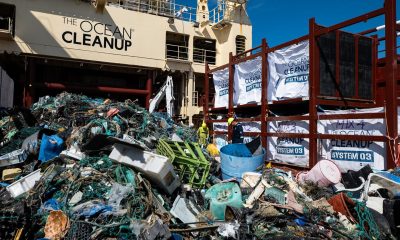News
Interview: Luke Pollard, MP for Plymouth, talks to Jeff Goodman about the proposed first UK National Marine Park

To date, I have always thought so-called marine protected areas in the UK to be a sham. Poorly regulated and enforced. Could this finally be a change of times? I was delighted to learn about the proposal for creating the UK’s first National Marine Park in my home counties of Devon and Cornwall. I caught the news recently and heard that initial funding has been awarded. Wonderful!
About Luke Pollard
Luke Pollard was elected as the Labour and Co-operative Member of Parliament for Plymouth Sutton and Devonport in June 2017. Luke was born and lives in Plymouth and is the first MP to be born in Plymouth since Michael Foot represented the city in 1945.
After winning the seat from the Conservatives, Luke was appointed PPS to Shadow Environment Secretary, Sue Hayman MP, before being promoted to Shadow Environment Minister responsible for Water, Flooding, Fishing and Coastal Communities in July this year.
In December 2018 at the University of Plymouth, Luke launched proposals to create the UK’s First National Marine Park (NMP) in Plymouth Sound.
Plymouth Sound is one of the most unique marine environments in the UK. It includes the Plymouth Sound and Tamar Estuaries Marine Protected Area designated for its abundance and diversity of wildlife, the largest naval base in western Europe, a nationally significant fish market, over 13,000 people in Plymouth are employed in the marine sector, it is home to world-class marine research and boasts a rich maritime history. Nowhere in the UK is more deserving of special recognition. Developing a National Marine Park (NMP) here in Plymouth will not only provide a huge local benefit but it will provide a model, which campaigners intend to roll out across coastal communities on a national scale. You can read more about this here.
Jeff: Thanks for taking time out to tell us more about the proposal for the UK’s first National Marine Park and I would like to heartily congratulate you and all the other people and groups involved in devising and moving this project forward.
How, when and why did you first become involved with the project?
Luke: It was just after Theresa May called the snap election in 2017 that I decided to make campaigning for the UK’s National Marine Park to be one of my key campaign pledges. Labour was 27 points behind in the polls and I thought: I have nothing to lose and so I might as well be bold and go for policies that will really make a difference. A marine park turned out to be one of the most popular pledges I made in 2017 and helped me get elected. Now, as an MP, I’m working with Plymouth City Council and our city’s academics including Professor Martin Attrill, who first proposed the concept, many years ago.
Jeff: Can you tell us the key aspects of the proposed park and how it would function?
Luke: The basic premise behind the National Marine Park is that people don’t know anything about marine protection. Plymouth Sound already has SSSIs, MCZs and a dozen other protected statuses, but it would be very hard to find anyone in Plymouth who could name more than one, if that. The idea behind a National Marine Park is that it takes a concept we all know, understand and value of a National Park, and applies it to the marine environment. Suddenly, you have public understanding of marine protection in a way that all the MCZs in the world don’t achieve. It is a gateway for understanding marine protections and helping people value the marine environment more.
Jeff: In my opinion, official marine parks in the UK are long over due and have always met fierce opposition especially from the fishing industry. What are the circumstances and conditions that have made this possible now?
Luke: The basic principle of a National Marine Park is that we must have sustainable environmental protections and sustainable economic activity. The drive to create a National marine park comes at the same time as there’s a real focus on fishing. Our local fleet has the potential to be more sustainable and more successful and that is why good dialogue between Government, councils and industry is needed to deliver improved sustainability locally.
Jeff: Will both commercial and recreational fishing in the park be regulated and enforced?
Luke: We are exploring with stakeholders about how a National Marine Park should work. There isn’t another UK marine park for us to follow so it is a bit of test and try. What we do know is that there are some very successful efforts by fishers and scientists to protect and repopulate different parts of our marine environment, minimise impact of fishing gear and value fishing more. It’s a work in progress here but we need a sustainable industry both environmentally and economically after all you can’t fish what isn’t there any more because of over-fishing.
Jeff: In a previous statement you mention the shock of seeing the BBC Blue Planet revelation of the state of our oceans. Have you always been concerned about the negative things we are doing to our planet or is this newly found?
Luke: As a young lad growing up in Devon, I remember swimming in the sea past floating turds and sanitary towels. That was because Britain used to flush our sewers right out to sea. It took billions of pounds and a national effort to achieve the clean and safe bathing waters around the south west coast. We need a similar national effort to deal with plastic pollution at home and abroad. Blue Planet II was a wake up call we must not ignore.
Jeff: Are you ever able to get out at sea and watch the incredible wildlife we have around our shores?
Luke: Very occasionally on the water via a kayak or stand up paddle board, but more likely from the coast paths around Plymouth.
Jeff: I cannot imagine the day when I won’t be able to get to the coast and be on the water. Do you snorkel or dive and been able to see first hand marine life in and around the shores of the UK?
Luke: I get so seasick which is rubbish for an MP who speaks so often about the importance of the Royal Navy, our fishing industry, marine science and our coastal waters. I do enjoy a bit of snorkelling and I’m a wild swimmer. There really is nothing better to relieve the stresses of Westminster than a swim in Plymouth Sound bobbing along with the waves on a sunny day and looking over the Hoe and foreshore. We are so lucky to have this on our doorstep and I want more people to take the plunge and explore our coast line whether on the coast path or by getting wet.
Jeff: Who do you think will be the main beneficiaries from the park?
Luke: We know that middle class folks tend to get the maximum returns from National Parks mainly because they can afford their own transport. I want to see the biggest benefits of a National Marine Park being those who come from our poorest communities. You only need to see the kids paddling in the sea on a sunny day in Plymouth to see how many are not wearing swimming costumes but underwear. Plymouth is one of the poorest cities in the country and being flanked by gorgeous countryside and beautiful beaches doesn’t change the economic challenges. But the sea is free and creating marine citizenship for every child so they understand and can engage with rock pools, waves and sandy beaches is vital. Some recent research found that in Plymouth – a city that prides itself on being Britain’s Ocean City – some 20% of kids have not even seen the sea. That needs to change. We have turned our back on the sea for far too long as a city and as a country and that needs to change.
Jeff: What will be the final budget needed to set the park up and keep it running and where will that money come from?
Luke: We have been successful in winning financial support from the Marine Management Organisation for some early work on the National Marine Park project. Final costs must match our ambition and that is being worked on now. I don’t want to see new levies or taxes to pay for the marine park. I think it needs to be an investment made by the city and our local businesses in its promotion and engagement. The National Marine Aquarium in Plymouth along with Plymouth Marine Laboratories and the Marine Biological Association have all committed effort to date and their enthusiasm and passion for the project is a real inspiration. The proposals have caught the imagination of marine scientists, engineers and local businesses as a way of telling the untold stories of our coast and coastal communities. I’m really excited about where this project is going and what it could achieve. The early stages are now underway but there is an awful lot of detail that still needs to be worked out ahead.
Jeff: Would the park create openings for park wardens and how would the park be enforced?
Luke: Plymouth Sound is already one of the most protected bits of water in the whole country. That’s protected by a range of government agencies and of course as Devonport is Western Europe’s largest Naval base, we have plenty of people with guns keeping an eye on our waters too! I think the concept of a national marine park needs to refresh enforcement and the best way to protect a bit of water is to have people value it and the diversity under the surface. The full details are being worked out but I really want to have the marine park tell the story of the people who work day in, day out protecting it already but the idea of park wardens as champions, educationalists and story tellers is something that has been proposed. We do need to protect our coastal waters and that means having the right people involved from Government and those conversations are starting to happen. It will take time but I think this is time well spent.
Jeff: I hope this will be a milestone in the future protection and longevity of our UK waters and wildlife. Will you personally take an interest in seeing this rolled out to the rest of the UK?
Luke: I want Plymouth Sound to be the UK’s first National Marine Park. That means we need to have a second, third, fourth, fifth in the pipeline. Britain’s coastline is incredible, with such beautiful diversity. I am certain there won’t be a shortage of candidates once the concept has been developed and rolled out in Plymouth.
Jeff: Is there anything now that we the general public can do to help this park become a reality?
Luke: Plymouth City Council who I passed the baton over to are consulting with local people and stakeholders and there’ll be events and consultations aplenty to contribute to in due course, but we don’t need to wait until a marine park is designated to make the most of our coastal waters today. So, visit a beach, go on a litter pick, reduce your plastic, learn to kayak or sail, walk on a beach or explore a coast path. At the moment, the biggest way people can get involved is to connect with the marine environment and share their stories.
Jeff: Thanks for taking the time to talk with me. Please do keep us informed if you can as the project moves forward and I hope you get time to get out and enjoy our wonderful marine wildlife.
Gear News
Go anywhere with Stahlsac
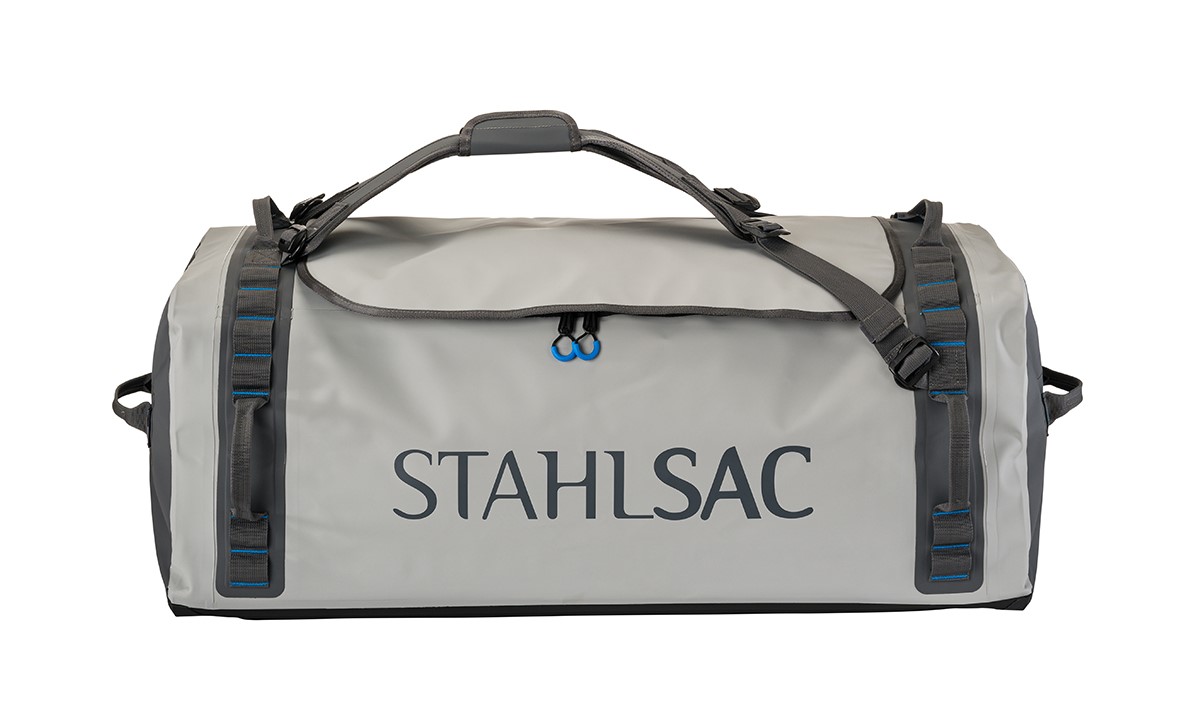
Stahlsac dive bags and travel luggage are built for our community of divers, surfers, kayakers and outdoor explorers who need bags that are constructed with durability, toughness, and 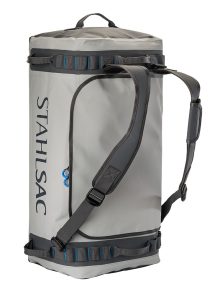 the highest quality the industry has ever seen. We were founded by one man determined to build better watersports and dive bags, and today, that mission is carried on by many. Adventure doesn’t just present itself; it requires discovery. When we design dive bags, we make sure they are tough enough for you to explore in all conditions—warm and cold, wet and dry—to the nearest and farthest reaches of the earth. And for those times you want to push the boundaries of adventure, Stahlsac dive bags make sure you can truly GO ANYWHERE.
the highest quality the industry has ever seen. We were founded by one man determined to build better watersports and dive bags, and today, that mission is carried on by many. Adventure doesn’t just present itself; it requires discovery. When we design dive bags, we make sure they are tough enough for you to explore in all conditions—warm and cold, wet and dry—to the nearest and farthest reaches of the earth. And for those times you want to push the boundaries of adventure, Stahlsac dive bags make sure you can truly GO ANYWHERE.
Abyss Duffels
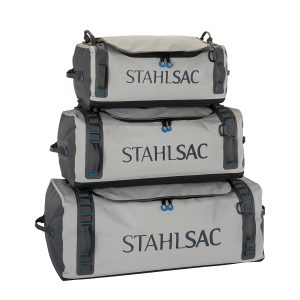 Made to be your partner-in-crime on every adventure, Stahlsac’s Abyss Duffels protects your gear from Mother Nature’s worst. Tough and 100% waterproof with double-TPU nylon material that shrugs off daily wear-and-tear, and RF-welded seams further boost the bag’s potential for lifelong exploring. Get Wet. Get Lost. Go Anywhere with Abyss.
Made to be your partner-in-crime on every adventure, Stahlsac’s Abyss Duffels protects your gear from Mother Nature’s worst. Tough and 100% waterproof with double-TPU nylon material that shrugs off daily wear-and-tear, and RF-welded seams further boost the bag’s potential for lifelong exploring. Get Wet. Get Lost. Go Anywhere with Abyss.
- A weatherproof duffel for trips, travel, and adventure
- Ultra-durable double-TPU nylon protects your gear
- Material repels water and keeps your equipment dry
- RF-welded seams are flush, tough, and waterproof
- Removable straps transform duffel into backpack
- Zippered internal stow compartments carry essentials
- External zippered flap is easy to open and close
- Welded external handles make transporting a breeze
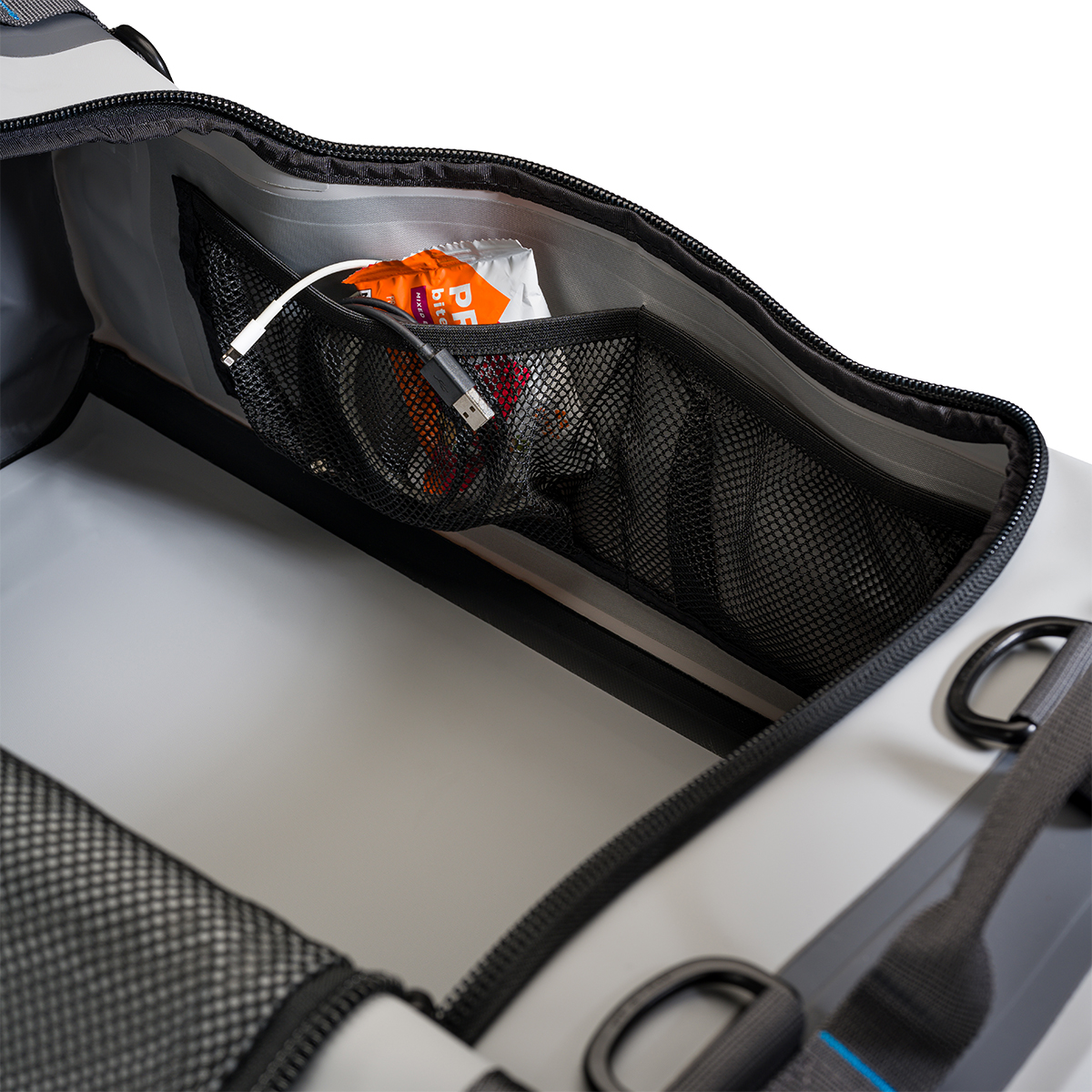
Panama Mesh Backpack
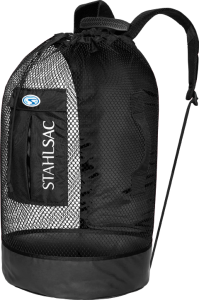 The most copied design in scuba diving, the Stahlsac Panama Mesh Backpack is the “original” design and features two high-density foam padded shoulder straps, extra durable polyester mesh, duffel bag handles and our unique zippered dry pocket inside that combines with a wet pocket outside. The bottom’s built from reinforced 18-gauge PVC nylon to combat the wear and tear of your active coastal lifestyle, and, as a bonus in every bag, we supply a 12″ x 12″ mesh drawstring satchel for extra stowing utility. Pack up your beach kit and go.
The most copied design in scuba diving, the Stahlsac Panama Mesh Backpack is the “original” design and features two high-density foam padded shoulder straps, extra durable polyester mesh, duffel bag handles and our unique zippered dry pocket inside that combines with a wet pocket outside. The bottom’s built from reinforced 18-gauge PVC nylon to combat the wear and tear of your active coastal lifestyle, and, as a bonus in every bag, we supply a 12″ x 12″ mesh drawstring satchel for extra stowing utility. Pack up your beach kit and go.
- Density foam padded shoulder straps
- Outside wet/dry pockets
- 2 Carry handles
- Tough, snag-resistant polyester mesh
- Reinforced PVC bottom
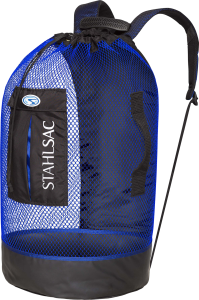
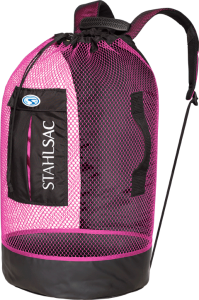
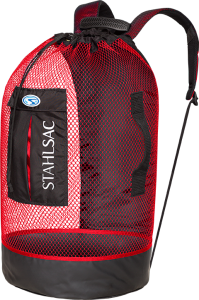
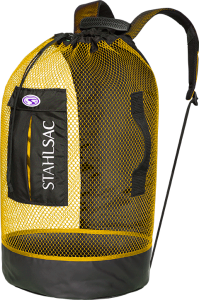
For more information about Stahlsac bags, visit www.stahlsac.com/dive-bags.
Sea & Sea is the home of Stahlsac and other leading diving brands in the UK.
Blogs
EXCLUSIVE: Jeff Goodman interviews Mark Spiers, CEO of New Scuba Diving Training Agency NovoScuba
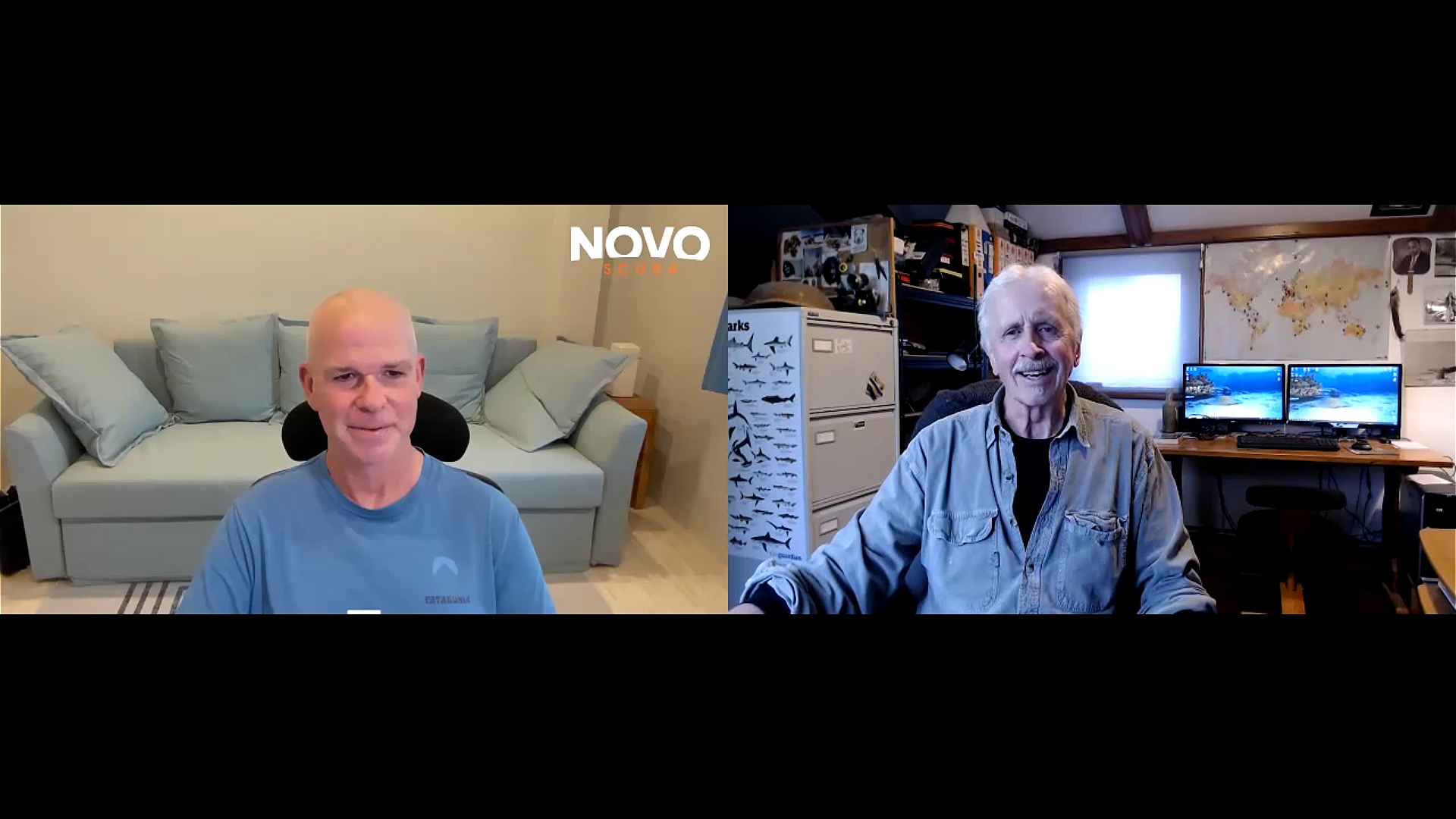
In a video recorded exclusively for Scubaverse.com, Jeff Goodman interviews Mark Spiers, CEO of new scuba diving training agency NovoScuba.
Find out more about NovoScuba at www.novoscuba.com.
-

 News3 months ago
News3 months agoCapturing Critters in Lembeh Underwater Photography Workshop 2024: Event Roundup
-

 Marine Life & Conservation Blogs3 months ago
Marine Life & Conservation Blogs3 months agoCreature Feature: Swell Sharks
-

 Blogs2 months ago
Blogs2 months agoMurex Resorts: Passport to Paradise!
-

 Gear Reviews3 weeks ago
Gear Reviews3 weeks agoGEAR REVIEW – Revolutionising Diving Comfort: The Sharkskin T2 Chillproof Suit
-

 Blogs2 months ago
Blogs2 months agoDiver Discovering Whale Skeletons Beneath Ice Judged World’s Best Underwater Photograph
-

 Gear Reviews3 months ago
Gear Reviews3 months agoGear Review: Oceanic+ Dive Housing for iPhone
-

 News2 months ago
News2 months agoPADI Teams Up with Wellness Brand Neuro to Drive Ocean Change and Create a Blue State of Mind
-

 Marine Life & Conservation2 months ago
Marine Life & Conservation2 months agoSave the Manatee Club launches brand new webcams at Silver Springs State Park, Florida


